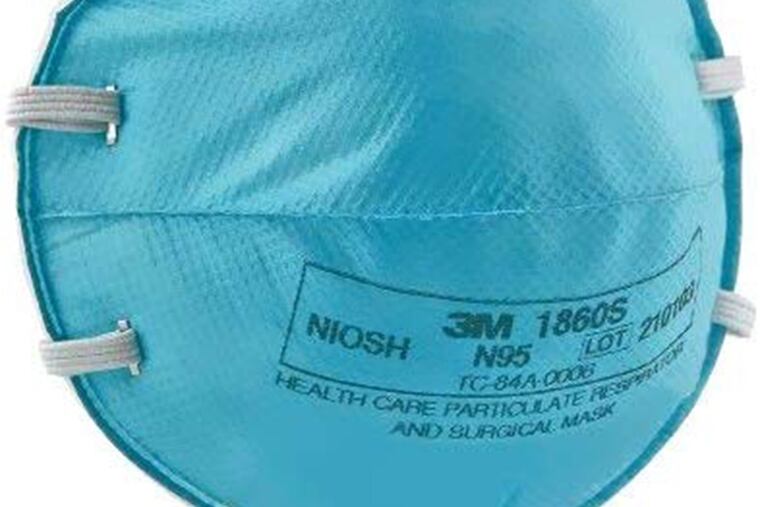U.S. government has 1.5 million expired N95 masks sitting in an Indiana warehouse
Nearly 1.5 million N95 respirator masks are sitting in a U.S. government warehouse in Indiana and authorities have not shipped them because they are past their expiration date.

Nearly 1.5 million N95 respirator masks are sitting in a U.S. government warehouse in Indiana and authorities have not shipped them because they are past their expiration date, despite Centers for Disease Control guidelines that have been issued for their safe use during the coronavirus outbreak, according to five people with knowledge of the stockpile.
Department of Homeland Security officials had a conference call Wednesday to figure out what to do with the masks, which are part of the U.S. Customs and Border Protection's emergency supplies. DHS officials decided to offer the respirators to the Transportation Security Administration, whose workforce has been clamoring for protective equipment, according to three of the people who described the plans on condition of anonymity because they were not authorized to discuss it publicly.
CBP has no plans to offer the masks to hard-hit hospitals, or hand them over to the Federal Emergency Management Agency, three of the people said.
The N95 masks, which provide essential protection to medical personnel treating infected patients, are one of the items that have gone lacking in New York City hospitals and across the country in recent days as demand for equipment soars. Manufacturers have said the masks remain effective if stored properly, and the main risk with age is that the masks' elastic bands can weaken and prevent a proper seal against a user's face.
According to two of the people with knowledge of the CBP stockpile, the masks are stored in a warehouse in Indianapolis.
Nathan Peeters, a CBP spokesman, said the agency is aware the supplies are available and that it has been "working with our DHS partners to determine the best use for N95 respirators in CBP's emergency stockpile."
The agency has provided a 30-day supply of protective equipment to Border Patrol agents and CBP officers, including N95 respirators, Peeters said.
"U.S. Customs and Border Protection's highest priority is to ensure the health, safety and security of our workforce and the American people," he said. According to Peeters, the agency is in the process of acquiring and distributing 1.5 million additional N95 masks and other protective gear that would be shipped in coming weeks.
It was unclear Thursday when the expired N95 masks in the Indiana warehouse would ship. FEMA did not respond to questions about the CBP stockpiles, and TSA officials did not immediately respond to a request for comment.
One administration official with knowledge of the plans said the decision was made to provide the masks to TSA because FEMA has been able to acquire a large number of new masks for distribution this week. President Trump said during a White House briefing Wednesday that FEMA has shipped or is in the process of shipping 9.4 million N95 respirators and 20 million surgical masks for hospitals.
"And we have others that we think are going to be delivered pretty quickly," Trump said.
The masks and other protective gear are in such short supply at some New York City hospitals that staff have been wearing plastic garbage bags and other improvised equipment as they hope to ward off infection while treating patients.
Health officials in Los Angeles county said its emergency supply of N95 masks is exhausted, encouraging doctors and nurses to consider reusing the disposable masks for multiple patients, a practice that is generally avoided because of the risk of spreading the virus among patients and hospital rooms.
The CDC issued new guidelines on Feb. 28 for the safe use of expired N95 masks, affirming that many models remain functional past their expiration date, provided they were properly stored. In normal circumstances, they would be discarded, but they still remain effective if the guidelines are followed.
"The respirators exceeding their manufacturer-designated shelf life are only being released due to the potential urgent demand caused by the covid-19 public health emergency," the agency said.
"In the face of this emergency, the U.S. government believes that the respirators beyond their manufacturer-designated shelf life should provide greater respiratory protection than surgical masks (i.e., medical masks) alone, improvised mouth and nose covers (e.g., bandannas), or no protection at all," the CDC said.
A senior administration official who spoke on the condition of anonymity because they were not authorized to discuss the masks, said the masks in CBP storage are in usable condition.
"The masks are fully capable," the official said. "We'd never put the lives of the men and women at DHS at risk."
Randolph "Tex" Alles, the acting undersecretary for management at DHS, has been tasked with figuring out how to distribute the CBP masks, according to two U.S. officials briefed on the plans who were not authorized to speak publicly. Alles did not respond to a request for comment.
The Washington Post’s Carol Leonnig contributed to this report.